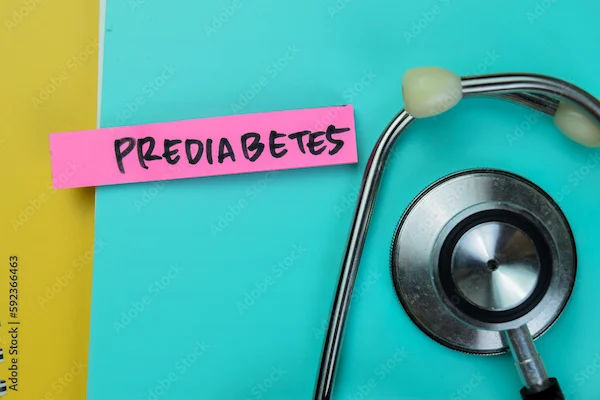Prediabetes: Ranges, Causes, and Treatment
Learn what prediabetes is, the blood sugar ranges, common causes, and how to reverse it with proven lifestyle changes. Early action can prevent type 2 diabetes.

Written by Dr. Siri Nallapu
Reviewed by Dr. Shaik Abdul Kalam MD (Physician)
Last updated on 22nd Jul, 2025

Introduction
Prediabetes is a condition where your blood sugar levels are higher than normal but not high enough to be classified as diabetes. It serves as a warning sign that you are at risk of developing type 2 diabetes if you don’t make lifestyle changes. The good news? Prediabetes can often be reversed with the right steps.
What Are the Blood Sugar Ranges for Prediabetes?
Doctors use three main tests to diagnose prediabetes:
1. Fasting Blood Sugar Test (FBS)
Normal: Less than 100 mg/dL
Prediabetes: 100–125 mg/dL
Diabetes: 126 mg/dL or higher
2. Hemoglobin A1C Test (Average Blood Sugar Over 3 Months)
Normal: Below 5.7%
Prediabetes: 5.7% - 6.4%
Diabetes: 6.5% or higher
3. Oral Glucose Tolerance Test (OGTT)
Normal: Less than 140 mg/dL after 2 hours
Prediabetes: 140-199 mg/dL after 2 hours
Diabetes: 200 mg/dL or higher
If your results fall in the prediabetes range, it’s time to take action.
What Causes Prediabetes?
Prediabetes happens when your body becomes insulin resistant, meaning your cells don’t respond well to insulin, the hormone that helps regulate blood sugar. Several factors contribute to this:
Being Overweight or Obese: Excess fat, especially around the belly, increases insulin resistance.
Lack of Physical Activity: Exercise helps your body use insulin effectively.
Unhealthy Diet: Eating too many sugary foods, refined carbs, and processed foods can spike blood sugar.
Family History: If diabetes runs in your family, your risk is higher.
Age (45+) & Ethnicity: Older adults and certain ethnic groups (South Asian, African, Hispanic) are more prone.
Gestational Diabetes: Women who had diabetes during pregnancy are at higher risk.
Sleep Issues & Stress: Poor sleep and chronic stress can affect blood sugar control.
How Does Prediabetes Affect Your Health?
If left unchecked, prediabetes can lead to:
Type 2 Diabetes (Higher risk of heart disease, nerve damage, kidney problems, and vision loss)
Heart Disease & Stroke (High blood sugar damages blood vessels over time)
Polycystic Ovary Syndrome (PCOS) (Common in women with insulin resistance)
The silver lining? Prediabetes is reversible with early intervention.
How Can You Manage or Reverse Prediabetes?
Let’s see how you can manage and reverse prediabetes:
1. Eat a Balanced Diet
Choose Whole Foods: Opt for vegetables, whole grains, lean proteins, and healthy fats.
Cut Down on Sugar & Refined Carbs: Avoid sugary drinks, white bread, and processed snacks.
Fibre-Rich Foods: Beans, lentils, oats, and fruits (in moderation) help control blood sugar.
Portion Control: Eating smaller, frequent meals prevents blood sugar spikes.
2. Stay Active
Aim for 150 minutes/week of moderate exercise (brisk walking, cycling, swimming).
Strength Training (2–3 times a week) improves insulin sensitivity.
Stay Active Daily: Even short walks after meals help.
Get Your Symptoms Checked By An Endocrinologist
3. Lose Weight (If Needed)
Losing just 5–10% of body weight can significantly lower diabetes risk.
4. Get Enough Sleep & Manage Stress
Sleep 7–9 hours per night—poor sleep affects blood sugar.
Practice Relaxation (Yoga, meditation, deep breathing) to reduce stress hormones.
5. Regular Check-Ups
Monitor blood sugar levels annually if you’re at risk.
If advised, consult a doctor for medications like Metformin (helps in some cases).
When to See a Doctor?
If you experience:
Increased thirst & frequent urination
Fatigue & blurred vision
Slow-healing wounds
It’s best to get tested early, as prediabetes often has no symptoms, so regular check-ups are key.
Conclusion
Prediabetes is a wake-up call, but you have the power to change it. Small, consistent lifestyle changes can prevent diabetes and improve overall health.
Need help?
Book a diabetes screening test on Apollo 24|7.
Consult a doctor or nutritionist for personalised advice.
Would you like to schedule a consultation or test? Let us guide you toward a healthier future.
Get Your Symptoms Checked By An Endocrinologist
Get Your Symptoms Checked By An Endocrinologist

Dr. Nithin Reddy Modhugu
Endocrinologist
6 Years • MBBS, MD (General Medicine), DNB (Endocrinology)
Hyderabad
Dr. Nithin's Endocrine Clinic, Hyderabad
(100+ Patients)

Dr. Gayatri S
Endocrinologist
4 Years • Suggested Qualifictaion- MBBS, MD (Internal Medicine), DM (ENDOCRINOLOGY)
Nellore
Narayana hospital, Nellore

Dr. Venkata Rakesh Chintala
Endocrinologist
8 Years • MBBS,MD( GEN MEDICINE), DM ( ENDOCRINOLOGY)
Krishna district
Sanjeevani Hospital, Krishna district
Dr. M.a. Mujeeb Afzal
Endocrinologist
13 Years • MBBS , MD (General medicine) , DM (Endocrinology)
Hyderabad
Premier Hospital, Hyderabad

Dr. Shiva Madan
Endocrinologist
10 Years • MBBS , MD (General medicine) , DM (Endocrinology)
Bikaner
Sushma diabetes and Endocrine center, Bikaner

